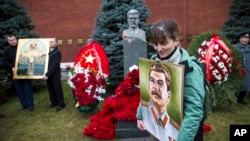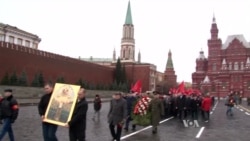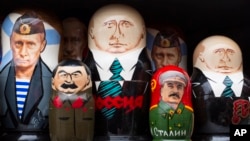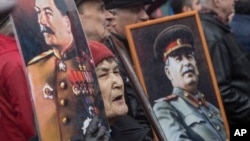Russia’s Communist Party on Monday honored the birthday of Soviet leader Joseph Stalin with flowers and speeches during an annual ritual at his grave on Moscow’s Red Square.
Gennady Zyuganov, head of the Communist Party of the Russian Federation (KPRF), gave a long, admiring speech on Stalin to the gathered crowd.
”Today, the experience and courage of Stalin, his genius and talent, should nourish all government officials who truly desire Russia to be kind, happy, and truly sovereign,” he said.
Clutching a painted portrait of Stalin, artist Oxana Dzhuga joined the birthday rally, calling him "the greatest leader in the history of Russia and the Soviet Union.”
“There's not been a better leader yet," she said.
Stalin’s supporters promote a one-sided view of his legacy as a strong leader who led the Soviet Union to victory in World War II and stood up to the West during the Cold War.
"By reinstating and continuing the best Russian imperial practices, following the war he created the most powerful block," said Zyuganov. "A block of Slavic governments and their friends that held NATO at bay, which the entire world feared."
Stalin revival
Stalin's reputation, along with Soviet imagery in general, is getting a boost in President Vladimir Putin’s Russia, where the former ruler is increasingly praised as a strong leader who brought unity, empire and victory to Russia — an image that, analysts say, Putin would like to share.
“Putin is re-writing history in that sense,” said Andrei Kolesnikov, chairman of the Russian Domestic Politics and Political Institutions Program at the Carnegie Moscow Center. “[Putin aims] to construct his own image as a very tough and effective leader, just like Stalin.”
Indeed, Putin has never joined annual memorial services for Stalin’s victims and famously called the collapse of the Soviet Union the greatest geopolitical tragedy of the 20th century. Conversely, however, Putin is supporting a project commemorating the victims of Stalin, known as the “Wall of Grief,” and Moscow recently opened a new gulag museum with official support.
As Kolesnikov tells it, the current Russian is trying to play up to a minority of critics in Moscow as well as the majority across Russia.
'Dark blotch' on Russian history
Stalin's political purges killed more than a million people, and millions more died mass starvation or in his gulag prison system.
"It's hard to imagine anybody who violated more human rights than Stalin, maybe he's even with Hitler,” said Galina Petrova, a Russian literature teacher.
“He's a monster, a hell spawn. The man's not a human," she told VOA. "He's a dark blotch on Russian and world history.”
But nationwide opinion polls show Russians holding a negative view of Stalin declining from 43% in 2001 to just 21% in 2015. Nearly half of Russians believe Stalin’s purges were necessary.
According to a report in the Moscow Times, a group of Russian nationalists interrupted a commemoration of victims of Stalin in St. Petersburg Sunday. The report says people brought photos of their relatives persecuted in Stalin’s purges to a gathering where nationalists showed up holding photos of Nazi leaders.
Petrova believes Stalin’s growing popularity is a reaction to massive corruption that was kept in check during Soviet times.
“There were not so many criminal elements in power like now,” she said. “So the longing for a strong hand is natural.”
Kolesnikov says Putin’s annexation of Crimea revived Russian sentiments of empire. Until last year, Putin extolled the idea that Russia’s military actions in Ukraine were to protect ethnic Russians in Novorossiya, a Tsarist-era term for the Russian empire in Ukraine.
The term was dropped from official jargon when it became clear that, outside of the self-declared republics of Donetsk and Luhansk, there was little support in eastern Ukraine to become part of Russia.
Not back to the USSR
In a Russian documentary film called World Order that aired on December 20, Putin said the West is trying to prevent Russia from recreating the Soviet Union.
"With Ukraine and other areas of the former USSR, I'm sure our Western partners aren't working in the interests of Ukraine,” he said. “They're working to prevent the re-creation of the USSR, but nobody wants to believe us, nobody wants to believe that we're not trying to bring the Soviet Union back.”
While Russians who forget their own history inevitably assess villains as heroes and vice versa, Russian public opinion, Kolesnikov warns, is easily shaped and can quickly change from one year to the next.
Mark Grinberg contributed to this report.















